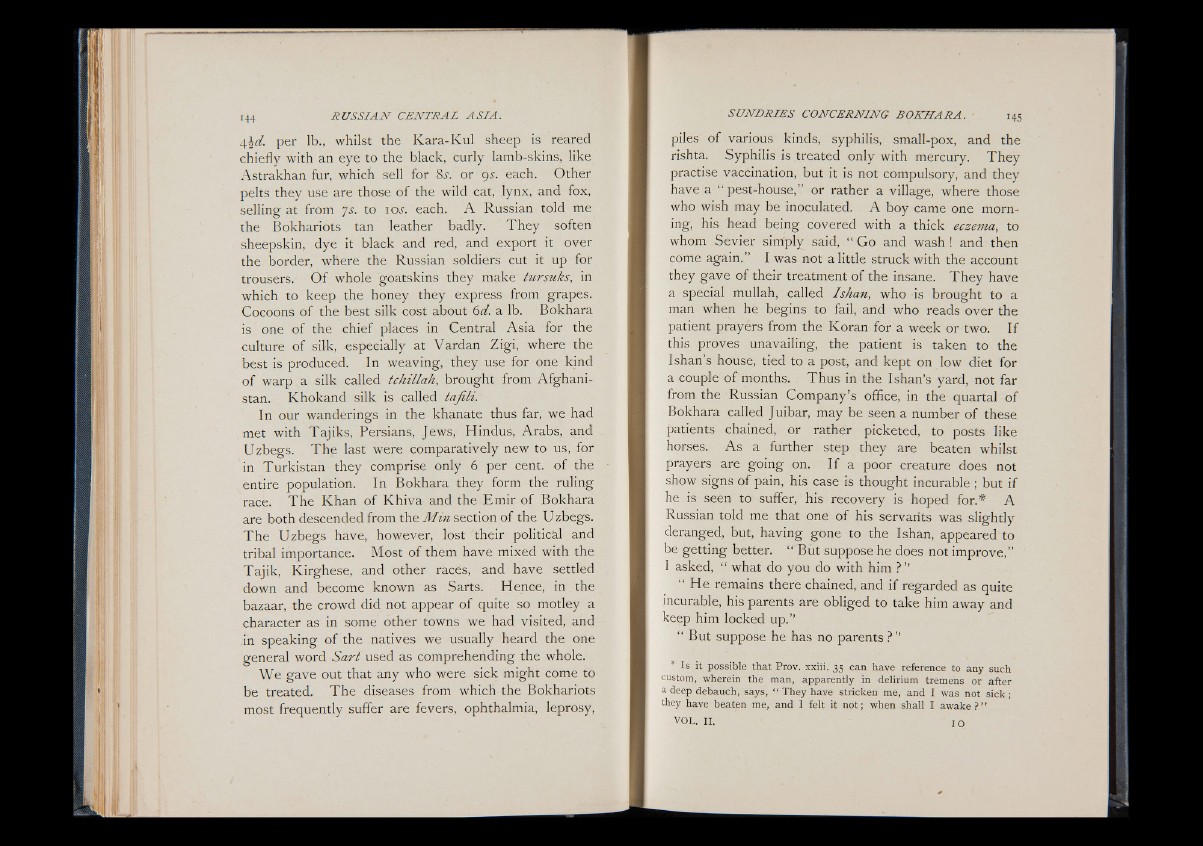
4\d. per lb., whilst the Kara-Kul sheep is reared
chiefly with an eye to the black, curly lamb-skins, like
Astrakhan fur, which sell for 85. or gs. each. Other
pelts they use are those of the wild cat, lynx, and fox,
selling at from js. to ios. each. A Russian told me
the Bokhariots tan leather badly. They soften
sheepskin, dye it black and red, and export it over
the border, where the Russian soldiers cut it up for
trousers. O f whole goatskins they make tursuks, in
which to keep the honey they express from grapes.
Cocoons of the best silk cost about 6d. a lb. Bokhara
is one of the chief places in Central Asia for the
culture of silk, especially at Vardan Zigi, where the
best is produced. In weaving, they use for one kind
o f warp a silk called tchillah, brought from Afghanistan.
Khokand silk is called tafili.
In our wanderings in the khanate thus far, we had
met with Tajiks, Persians, Jews, Hindus, Arabs, and
Uzbegs. The last were comparatively new to us, for
in Turkistan they comprise only 6 per cent, of the
entire population. In Bokhara they form the ruling
race. The Khan of Khiva and the Emir of Bokhara
are both descended from the M in section of the Uzbegs.
The Uzbegs have, however, lost their political and
tribal importance. Most of them have mixed with the
Tajik, Kirghese, and other races, and have settled
down and become known as Sarts. Hence, in the
bazaar, the crowd did not appear o f quite so motley a
character as in some other towns we had visited, and
in speaking o f the natives we usually heard the one
general word Sari used as comprehending the whole.
We gave out that any who were sick might come to
be treated. The diseases from which the Bokhariots
most frequently suffer are fevers, ophthalmia, leprosy,
piles of various kinds, syphilis, small-pox, and the
rishta. Syphilis is treated only with mercury. They
practise vaccination, but it is not compulsory, and they
have a “ pest-house,” or rather a village, where those
who wish may be inoculated. A boy came one morning,
his head being covered with a thick eczema, to
whom Sevier simply said, “ Go and wash ! and then
come again.” I was not a little struck with the account
they gave of their treatment of the insane. They have
a special mullah, called Ishan, who is brought to a
man when he begins to fail, and who reads over the
patient prayers from the Koran for a week or two. If
this proves unavailing, the patient is taken to the
Ishan’s house, tied to a post, and kept on low diet for
a couple of'months. Thus in the Ishan’s yard, not far
from the Russian Company’s office, in the quartal of
Bokhara called Juibar, may be seen a number of these
patients chained, or rather picketed, to posts like
horses. As a further step they are beaten whilst
prayers are going on. I f a poor creature does not
show signs of pain, his case is thought incurable; but if
he is seen to suffer, his recovery is hoped for.# A
Russian told me that one o f his servants was slightly
deranged, but, having gone to the Ishan, appeared to
be getting better. “ But suppose he does not improve,”
I asked, “ what do you do with him ? ”
“ He remains there chained, and if regarded as quite
incurable, his parents are obliged to take him away and
keep him locked up.”
“ But suppose he has no parents ? ”
* Is it possible that Prov. xxiii. 35 can have reference to any such
custom, wherein the man, apparently in delirium tremens or after
a deep debauch, says, “ They have stricken me, and I was not sick;
they have beaten me, and I felt it not; when shall I awake?”
VOL. II. jo